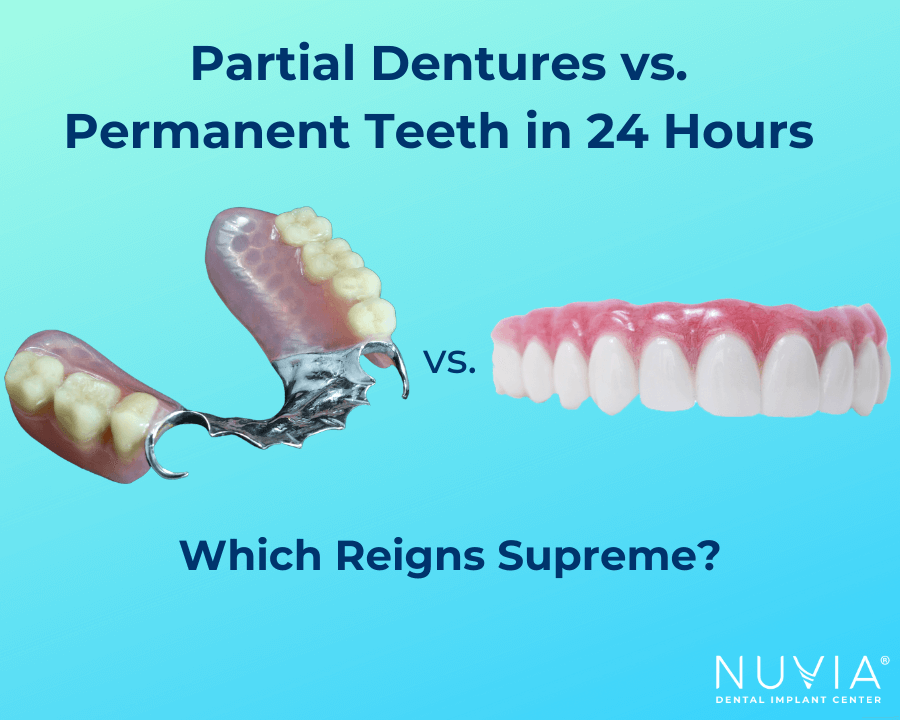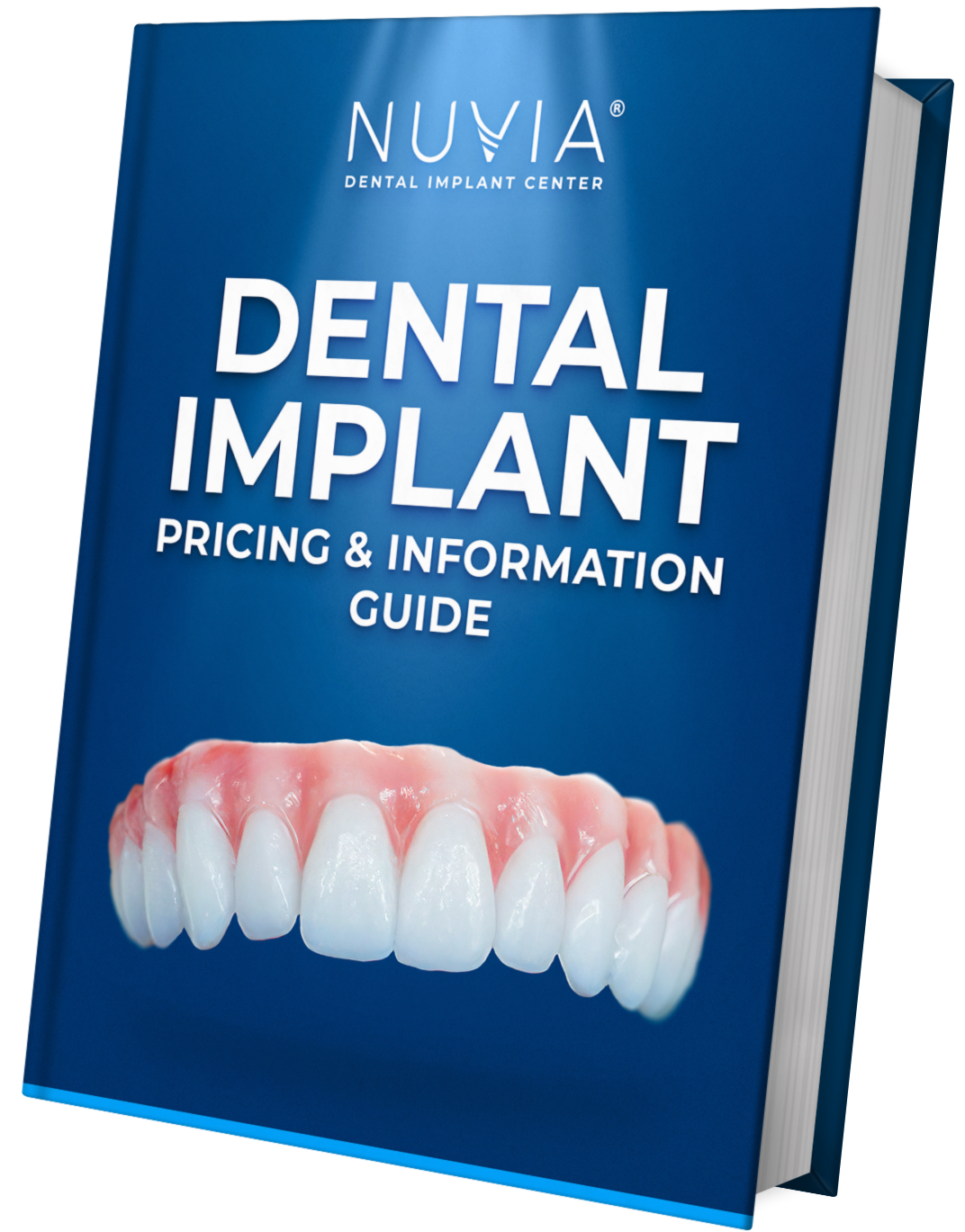
Are Dental Implants Safe?
Find Out If You May Be EligibleFor Permanent Teeth in 24 Hours
Get The Dental Implant Cost Guide

Those considering options for replacing missing teeth, often ask the question, “are dental implants safe?”. As one of Nuvia’s oral surgeons I get the opportunity to work closely with patients who have these concerns and make sure they feel comfortable as they take steps to improve their life with a new smile.
If you’re ready to make a change and experience a better life with dental implants, this article is for you. Here is what you should know about the safety of dental implants and what you can expect from working with Nuvia Dental Implant Center for permanent teeth in 24 hours.
Wondering if dental implants are right for you? See if you may be a candidate with this 60 second quiz
Success Rate of Dental Implants
Dental implants have an excellent success rate, a fact I always emphasize to my patients. The procedure is relatively non-invasive, allowing patients to return home immediately afterward. As an outpatient procedure dental implants are typically quite brief. In comparison to other types of implantable medical devices, dental implants have an exceptionally high success rate. Those within the dental community generally agree, and my experience supports, that dental implants succeed in the mid to high nineties percentile, which is incredibly reassuring.
Dental implants are one of the solutions for missing teeth that leaves patients overjoyed with their new smile. As someone about to regain their smile, you shouldn’t have to wonder “are dental implants safe?”, rather find comfort in knowing that they have a great success rate and can change your life. Their design and method of placing have been improved over the years to ensure a procedure that is not only minimally invasive but also highly effective.
My patients have a truly unique experience with Nuvia. Nuvia Dental Implant Center has improved upon current, traditional methods of dental implants to provide permanent teeth in 24 hours rather than having patients wait for what may be up to 10+ months using temporary teeth before getting their permanent prosthetics, (fake teeth) placed. These innovations have been tremendously successful and have changed so many patient’s lives.
Are Dental Implants Safe for the Elderly?
What I tell my patients about the success rate of dental implants, goes for all of them who are eligible as candidates for dental implants - young or old. Wondering if this is you? See if you might be a candidate by taking this 60 second quiz.
Given the general principle that dental implants are an outpatient procedure of relatively low risk, they can be deemed safe for the elderly, provided the patient is in suitable health to undergo minor surgery. However, individual health factors, such as bone density and gum health, play a critical role in determining eligibility on a case-by-case basis.
So, Are Dental Implants Safe?
The short answer is a resounding yes. The procedure's high success rate, combined with its straightforward and minimally invasive nature, makes dental implants a safe choice for those looking to address missing teeth.
Furthermore, the potential risks associated with dental implants are notably lower compared to other surgical interventions, particularly those involving vital organs.

Complications From Dental Implants Are Very Rare
It's important to note that complications from dental implants are very rare. The procedure's design and execution have been optimized over years of clinical practice and research, minimizing the risk of complications and providing patients with resources to properly care for their dental implants.
The Risk of NOT Doing Anything for Dental Issues
You may have wondered “are dental implants safe?”, but have you considered the dangers of not getting dental implants when your oral health could benefit from them? This is always a conversation I have with my patients so they understand the risks that can come from missing teeth or poor dental health.
Leaving dental health issues unaddressed or ignoring missing teeth can lead to further issues and deterioration. This can include the following:
- Bone loss
- Shifting of remaining teeth
- Increased risk of cardiovascular disease
- Risk of Alzheimer’s disease
- Increased risk of death
- And overall health risks
Full mouth dental implants are safe and may put you at a decreased risk of some of these conditions because they can help treat these underlying dental and periodontal conditions.

Ready to improve your oral health with dental implants? See if you may be a candidate with this 60 second quiz.
Commons Questions Related to “Are Dental Implants Safe?”
Are dental implants safe long term?
Not only are dental implants considered safe in the long term, they can help to prevent against other serious issues that could be caused by existing dental issues.
What is the most common problem with dental implants?
Complications from dental implants are relatively rare, especially with proper maintenance post-surgery. Many times, these rare complications can be associated with implant failure. Rest assured that the success rate of dental implants is extremely high, in the mid-to-high ninety percent range.
Is there a downside to dental implants?
One big downside with traditional methods of getting dental implants can be the time and patience required to complete the process. At Nuvia patients get their permanent teeth 24 hours after surgery, a vast difference compared to the up to 10+ months that may be needed to get permanent teeth through more traditional methods. With Nuvia, you don’t need to worry about coming in multiple times before getting your permanent teeth due to temporary teeth that may be more likely to crack and break.
What is the best age for dental implants?
The best age for dental implants is once the jaw has stopped growing, which is generally over the age of 21. This ensures the jawbone is fully developed to support the implant effectively.
More Articles Like This one

A Step-by-Step Guide to Getting Dental Implants: What to Expect

Sleep Through the Entire Dental Implant Procedure At Nuvia






